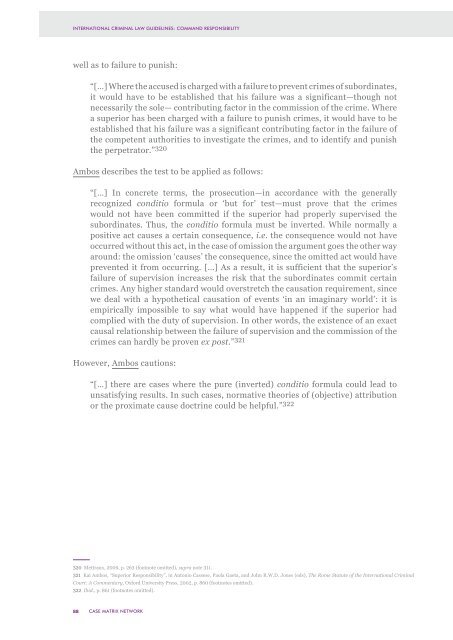Command Responsibility
CMN_ICL_Guidelines_Command_Responsibility_En
CMN_ICL_Guidelines_Command_Responsibility_En
You also want an ePaper? Increase the reach of your titles
YUMPU automatically turns print PDFs into web optimized ePapers that Google loves.
INTERNATIONAL CRIMINAL LAW GUIDELINES: COMMAND RESPONSIBILITY<br />
well as to failure to punish:<br />
“[…] Where the accused is charged with a failure to prevent crimes of subordinates,<br />
it would have to be established that his failure was a significant—though not<br />
necessarily the sole— contributing factor in the commission of the crime. Where<br />
a superior has been charged with a failure to punish crimes, it would have to be<br />
established that his failure was a significant contributing factor in the failure of<br />
the competent authorities to investigate the crimes, and to identify and punish<br />
the perpetrator.” 320<br />
Ambos describes the test to be applied as follows:<br />
“[…] In concrete terms, the prosecution—in accordance with the generally<br />
recognized conditio formula or ‘but for’ test—must prove that the crimes<br />
would not have been committed if the superior had properly supervised the<br />
subordinates. Thus, the conditio formula must be inverted. While normally a<br />
positive act causes a certain consequence, i.e. the consequence would not have<br />
occurred without this act, in the case of omission the argument goes the other way<br />
around: the omission ‘causes’ the consequence, since the omitted act would have<br />
prevented it from occurring. […] As a result, it is sufficient that the superior’s<br />
failure of supervision increases the risk that the subordinates commit certain<br />
crimes. Any higher standard would overstretch the causation requirement, since<br />
we deal with a hypothetical causation of events ‘in an imaginary world’: it is<br />
empirically impossible to say what would have happened if the superior had<br />
complied with the duty of supervision. In other words, the existence of an exact<br />
causal relationship between the failure of supervision and the commission of the<br />
crimes can hardly be proven ex post.” 321<br />
However, Ambos cautions:<br />
“[…] there are cases where the pure (inverted) conditio formula could lead to<br />
unsatisfying results. In such cases, normative theories of (objective) attribution<br />
or the proximate cause doctrine could be helpful.” 322<br />
320 Mettraux, 2009, p. 263 (footnote omitted), supra note 311.<br />
321 Kai Ambos, “Superior <strong>Responsibility</strong>”, in Antonio Cassese, Paola Gaeta, and John R.W.D. Jones (eds), The Rome Statute of the International Criminal<br />
Court: A Commentary, Oxford University Press, 2002, p. 860 (footnotes omitted).<br />
322 Ibid., p. 861 (footnotes omitted).<br />
88<br />
CASE MATRIX NETWORK


